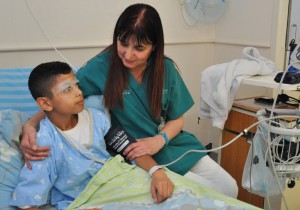A week before Purim, two children have been involved in serious accidents involving holiday-related toys that, without skillful medical attention, could have killed or seriously maimed them.
A two-and-a-half-year-old toddler from Ashdod inhaled a toy whistle on Wednesday and was in danger of choking. He was rushed to Kaplan Medical Center, where surgeons pulled the toy out of his trachea.
The boy was in respiratory distress, but fortunately the holes in the whistle enabled him to breathe somewhat before he reached medical help, said Dr. Noam Bar Tov, an ear-nose-and-throat specialist at the Rehovot hospital.
“My daughter noted that he was playing and suddenly started to cough and wheeze,” said the father. “Our family doctor tried to pull it out but failed, so we called an ambulance to take us to Kaplan. He was in respiratory stress.
Bar Tov urged parents to check the safety and suitability of all toys before letting children use them, and especially before and during Purim. Although there is supervision of imported toys by the authorities, illegal explosives and other dangerous objects nevertheless reach the markets and endanger children, he said.
Guy Shahar, a 12-year-old Rehovot boy was injured in his right eye when a friend accidentally shot him with a toy air rifle, causing the eye socket to suffer internal bleeding and swell up with fluids.
He was given drugs by Kaplan doctors, who managed to minimize the damage and ordered him to rest until Purim. The boy decided to throw away all toy weapons in his home.
Magen David Adom warned the public to keep explosives, including caps, away from children. These should never be kept in pockets, as they can easily explode, or be in the vicinity of eyes and ears.
Toy guns that shoot plastic balls can cause serious harm to eyes, ears, the abdomen, neck and limbs, as well as serious skin burns, MDA said.
Inflammable Purim costumes also pose dangers, said MDA. If you make your own, make sure the components are not combustible and that the costumes allow children to see clearly when they move about and are not at risk of falling or being involved in an accident. Some Purim dos and don’ts: • Costumes with chemical protection against fire should be dry cleaned before use rather than washed, so the protection does not disappear. Manufactured costumes should not be purchased unless they bear a label stating they are nonflammable.
• Costumes should be suited to the child’s size and be worn close to the body.
There should be no danger of hair being caught. Never allow spray foam to reach eyes or mouths, and don’t spray them at a fire or heaters. If any spray enters the eyes, wash them with a lot of water and do not rub.
• Don’t apply facial makeup unless it has been approved by the Health Ministry. Don’t allow children to wear masks that significantly reduce their field of vision.
• In the event of a person being set afire, lay him or her on the ground and roll him in sand or earth, douse him with water or cover him (but not his face) with a wet blanket.
Do not remove burnt clothing or apply oily creams on the burnt skin.
• If someone reacts to chemicals with a significant allergy, call MDA at 101 immediately.
Meanwhile, Soroka University Medical Center in Beersheba advised caution in eating the sweet goodies exchanged during Purim.
One hamantasch pastry has 150 to 200 calories, depending on the filling. Clinical dietitian Adina Ben-Aharon said that if you do buy these Purim delicacies, they should be made with whole-wheat flour, filo or yeast dough and not with margarine or butter.
Do not allow children under the age of five to eat small, hard foods like nuts, dried fruit, or popcorn, because they could choke on them.

